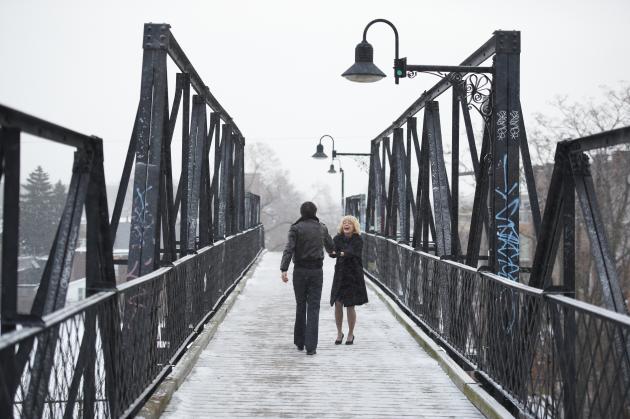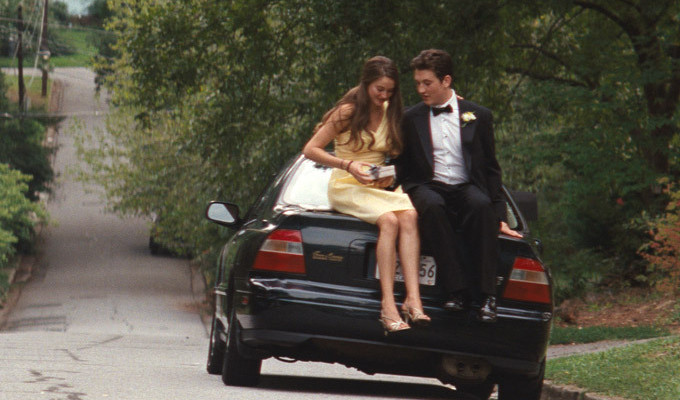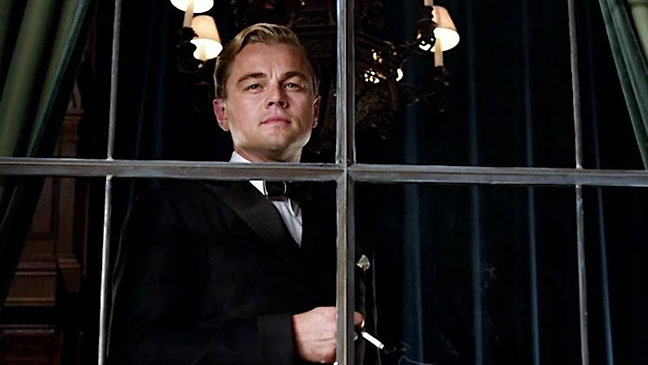Arrive at coffee shop. Dance with your decision to order coffee or tea since it will be the second cup of the morning. Wonder if it's actually caffeine that incites jumpy hands and a wandering mind, or just the weight of time. Think about True Detective's treatment of time and Sunday's penultimate episode. Time is a flat circle, you know. Realize it's your turn to order. Panic order a latte and bagel with cream cheese, which was never a part of the plan. Request extra cream cheese. Because, why not?
Realize there are no available seats with easy access to a power plug-in. Feel sadness, or something similar, about your inability to remember to keep your devices charged. Look at your phone. 21% and waning. Unpack your bag of tricks anyway. Computer, phone, headphones, book, second book (as if you might finish the first book in a day's work); beloved Pilot pen. See how many windows you can actually open on Google Chrome. Tweet something random. Get lost on Twitter. Read this. Think it's fantastic. Experience a fantasy daydream moment about the pulitzer prize. The image on the medal itself - how hard he must be pulling on the vestige of some ancient dream, about to fall.
Watch people - the way they move, the way they move when they know they are being watched - the way they like it, the way they don't. Realize time is waning just like your phone battery. Write a few sentences. Get distracted and then lost on a really weird Tumblr for longer than can accurately be admitted. Think about words. Yearn for your headphones to play your music even louder - the full consumption water gives when invading underwater ears. Get lost on Spotify; wonder why people don't use the private session feature more often. They should.
Turn music even louder to drown out ladies who have weekday coffee dates sitting next to you. Turn down the music to listen to their Oscar recap. They loved Philomena and thought Lupita's dress was too low-cut since she's flat chested; so upsetting that Ellen would joke about Liza, just where was George Clooney? Sometimes people surprise you, sometimes they don't. Music turned back up for Ólafur Arnalds Living Room Songs. Swear you can feel it move from the middle of you and then outwards; sensations like the edges of fire or something more destructive. Think about the book sitting behind your computer. John Cheever, that Chekhovian storyteller of the suburbs - the doormen of the the Upper East Side, the illuminated houses in Connecticut suburbs where dark nights and long days reveal gin-soaked swimmers and the ghost of some summer’s past.
Feel hungry, but realize it’s an excuse to walk away. The stories we tell ourselves in procrastination or panic are far more survivalist than any real urge to feed or feel. Wonder if it's possible to create and remain invulnerable. See someone you know through the window; freeze in motion while you wonder if you should duck or wave. Press your back against the glass in hopes it might embrace or destroy you, a cool and terrifying illusion. Pray for silence, turn up the music until it hurts your ears. Take the final sip of cold coffee. Should have gotten tea. At some point in your Spotify session, rediscover Nathaniel Rateliff’s album, Falling Faster Than You Can Run. Realize (again) vulnerability is the point. Listen to the album multiple times. Make note in margin: running will do you no good, I'm going to fall, and probably should. Turn back to words.
Vintage Cheever, Collected Stories
Feel hungry, but realize it’s an excuse to walk away. The stories we tell ourselves in procrastination or panic are far more survivalist than any real urge to feed or feel. Wonder if it's possible to create and remain invulnerable. See someone you know through the window; freeze in motion while you wonder if you should duck or wave. Press your back against the glass in hopes it might embrace or destroy you, a cool and terrifying illusion. Pray for silence, turn up the music until it hurts your ears. Take the final sip of cold coffee. Should have gotten tea. At some point in your Spotify session, rediscover Nathaniel Rateliff’s album, Falling Faster Than You Can Run. Realize (again) vulnerability is the point. Listen to the album multiple times. Make note in margin: running will do you no good, I'm going to fall, and probably should. Turn back to words.
Falling Faster Than You Can Run
Mod y Vi Records
Mod y Vi Records
2014
“A writer can be seen clumsily learning to walk, to tie his necktie, to make love, and to eat his peas off his fork. He appears much alone and determined to instruct himself. Naive, provincial in my case, sometimes drunk, sometimes obtuse, almost always clumsy, even a selected display of one’s early work will be a naked history of one’s struggle to receive an education in economics and love.”
John Cheever - Preface, The Stories of John Cheever
John Cheever - Preface, The Stories of John Cheever












